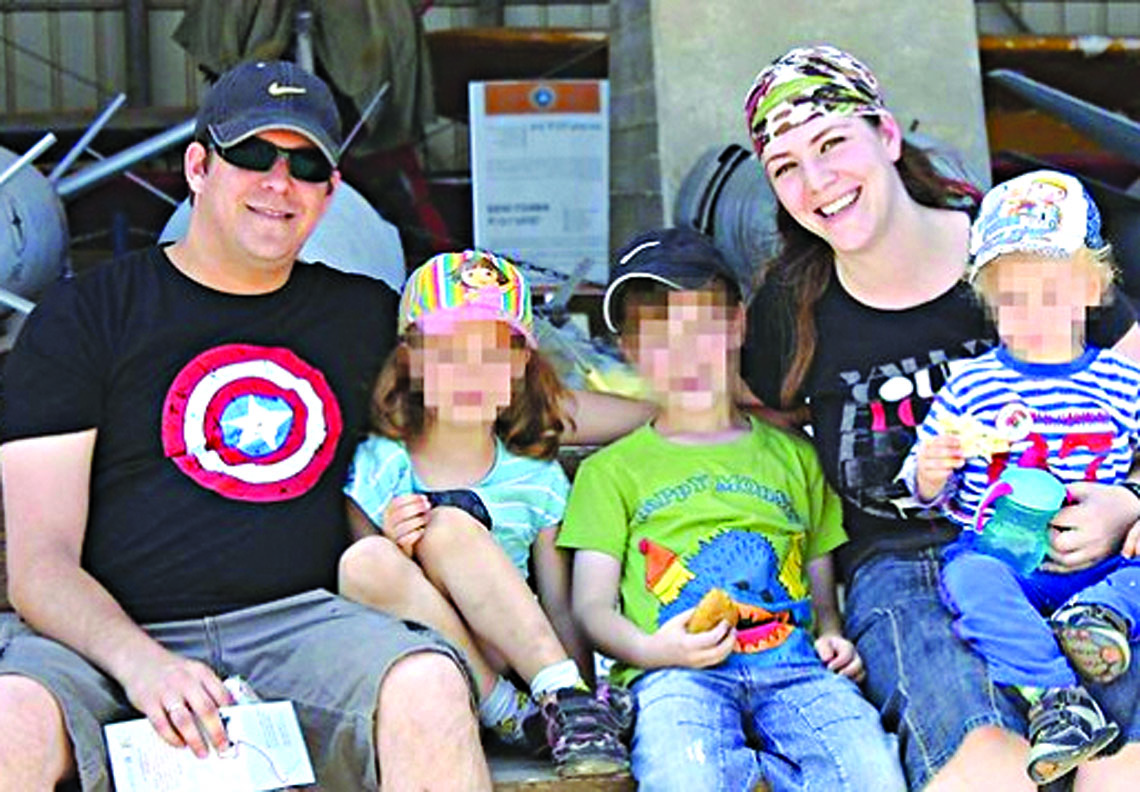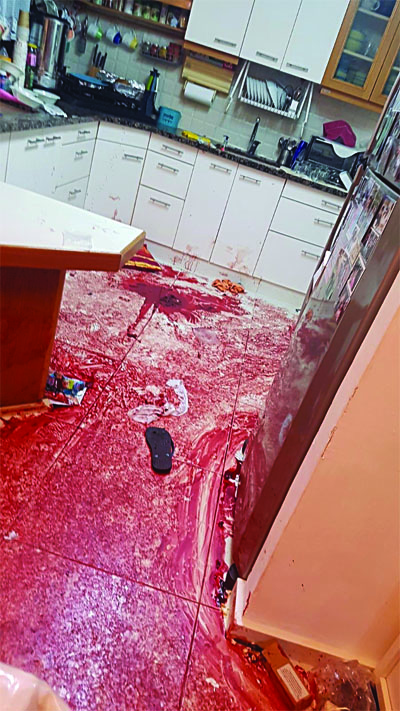 Elad Salomon with his wife, Michal, and three of their children. Elad, his father and his sister were stabbed to death on July 21 in a terrorist attack at Halamish.
Elad Salomon with his wife, Michal, and three of their children. Elad, his father and his sister were stabbed to death on July 21 in a terrorist attack at Halamish. Three days after an Israeli father and two of his children were stabbed to death on Shabbat by a Palestinian in a West Bank settlement, I found myself with 16 other progressive rabbis sitting shivah for the deceased, the Salomons, in a Charedi neighborhood.
It was perhaps the hardest moment of a recent visit to Israel — sitting with the other Americans, our shoulders, heads and legs covered as we paid our respects to this grieving family. We stood out among the others and were stared at by many, and yet, we found many surprising similarities between us and were received by the family with such grace and warmth and real gratitude that it moves me deeply just to recall it.
I have been coming to Israel for more than 20 years, and these visits have never been picture perfect. I lived here as a rabbinical student in the 1990s, during the huge marches for peace, which then brought about the tragic assassination of Yitzhak Rabin after he signed the Oslo peace accords. Shortly after I arrived with a group from my congregation in 2006, the second Lebanon war broke out. And a few years ago, when I brought another group, our ice-breaker the first morning ended with the sound of sirens and instructions to head to shelters because missiles had been launched and Iron Dome activated.
I’m used to arriving in Israel and having things change dramatically within hours or days, but I was hoping this time would be different. It wasn’t.
As Tisha b’Av approaches — it begins the evening of July 31 — I am keenly aware of the dual realities that animate Israeli life. The destruction of the Temples in flames, the massacre of other Jews in so many other times and places, all of the hatred that has been and still is directed at us as a people is real and palpable here as Israel continues to fight for legitimacy and the safety of her people. It pervades every political conversation, every heated argument, every major decision. The pain of the past and the fear our people have internalized, coupled with the fact that this is the Middle East, makes this place a tinderbox ready to ignite at any moment.
It took no time for me to be reminded of all this when I came last week for the American Israel Education Foundation Rabbinic Seminar to travel across the country with colleagues and learn from experts about the complex issues at play here. We arrived hearing that the government had rescinded the agreement that took years to craft, granting egalitarian services at the Western Wall. Local people and delegations from the United States turned out and protested the government’s reversal of policy.
But that was just the beginning. The big news as we arrived was the government response to a challenge from the Israel Religious Action Center, opposing government discrimination against gay and lesbian couples wanting to adopt children. The government alleged that being raised by a same-sex couple would prove harmful to a child because it would “load extra baggage on the child.” As a social liberal and as a lesbian mother, this was particularly painful and disappointing for me, as it was for all of our delegation.
We stood out among the others and were stared at by many, and yet, we were received by the family with such grace and warmth and real gratitude.
Immediately, 90,000 people signed a petition against the decision, including professional organizations of psychologists, mental health professionals, social workers and others. They argued that all research proves that children are better off in a loving home with loving parents of any kind. What amazed me was that, in Tel Aviv, 15,000 people turned out to protest the government’s position. I was deeply moved by how far ahead of the government so much of the Israeli public is on issues like this.
But as soon as there is a march to further the cause of social justice, there is another mass gathering resulting from another kind of deep tension here. Israeli Jews, Israeli Arabs and Palestinians we’ve met with all agree on one thing: Narratives and symbols have great power here in Jerusalem and go beyond reason to powerful emotion very quickly. Actions taken even for good reasons become flash points because they trigger a deeper struggle — the struggle between two peoples and the narratives that express their existential understandings of themselves and their place in the world. And this is what is at the heart of what’s been happening recently on the Temple Mount.
On July 14, two Israeli Arabs murdered two Israeli Druze police officers guarding the Temple Mount. As a result, the government decided to place metal detectors at the entrance to the area. The decision to physically put them in place just hours after the shooting prompted a heated reaction from Palestinians, who saw this as a breach of the status quo at their holy site. Protecting Israelis from those who would murder them makes sense, and the Israeli government has every right to take any action it deems necessary to protect its citizens. What is so sad and shortsighted is that the decision was implemented in a way that completely ignored how this action would be perceived and used by extreme elements within the Arab world.
And it was used: Extremists claimed that Jews were preventing Muslims from praying at Al-Aqsa and called on their faithful to protest in massive numbers. Clashes with police happened on a large scale hours after 15,000 Israelis marched for LGBT adoption rights in Tel Aviv.
After incitement by Hamas and other radical groups, thousands of Palestinians clashed with police July 21 in the West Bank, and three Palestinians were killed. Later that night, a 19-year-old Palestinian climbed the fence of a Jewish settlement in the West Bank where three generations of the Salomons were celebrating Shabbat and the birth of a new baby. The suspect stabbed three people to death and wounded another, leaving a bloody scene in his wake.
In the same 24 hours, Israel moved from a place with an active debate that would be celebrated in any democracy about social policy to a place where one action that should have made sense tore apart society.

The deep divides between the secular and religious, Palestinians and Israelis, haves and have-nots, hawks and doves will not be bridged in our lifetimes — if ever. As a wise teacher told us on this trip, the oldest Hebrew texts talk about peace and justice in terms of seeking, not of achieving. We are not a people of arrival but of journey “toward.” If there is a people who can model for the world that humans can vigorously pursue ideals they know they never will see fully realized, it is the Jewish people. If there is any country that can make titanic struggles into creative new paradigms, it is Israel.
Our teacher also taught us that he does not view the glass as half full but believes it is important to celebrate that the opportunity exists to pour water into the glass. We break a glass at every Jewish wedding to symbolize what is still broken in our world.
Tisha b’Av reminds us of this so well. What I love about Israel and her people is that even with all that I’ve described, there is a spirit of innovation, creativity, lust for life and defiant hope that also is ingrained in our people. While biblical Israelite religion was destroyed when the Temple burned, Rabbinic Judaism was born at the same time. With every tragedy and act of brutality that happens here, something new and unanticipated is created.
May we have the continued strength to crush glass at our most joyful times so that we remain mindful of the shattered and broken world we live in, the world of conflicting and sometimes flammable confrontation with one another. May we also bless the fact that we are given a glass and the opportunity, as our wise teacher said, to pour water into it at all.
Amid all of the tension and all the misunderstanding and mistrust in Israel these days, our experience of sitting with the Salomons, people in such pain, as a sacred act is an example of the only solution — encountering one another as human beings. As someone very wise once said, “If our hearts must break, let them break open.”
Rabbi Amy Bernstein is senior rabbi at Kehillat Israel Reconstructionist Congregation of Pacific Palisades.





















 More news and opinions than at a Shabbat dinner, right in your inbox.
More news and opinions than at a Shabbat dinner, right in your inbox.